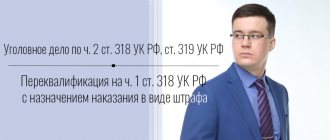As part of enforcement proceedings, a fine may be collected for administrative offenses and for criminal offenses. The basis for starting collection will be court decisions and sentences in the relevant case, acts of other bodies and officials. For late payment or other illegal actions, additional sanctions may be imposed on the debtor. Also, a separate type of penalty is an enforcement fee assigned by the bailiff. After deduction, the amount of the fine for enforcement proceedings is credited to the budget.
Types of fine calculation
A fine is a criminal punishment of a property nature. In Part 1 of Art. 46 of the Criminal Code of the Russian Federation directly states that a fine is a monetary penalty imposed within the limits provided for by the Criminal Code of the Russian Federation. The amount of the fine can be calculated in three ways:
- in an amount corresponding to a certain amount of money;
- in the amount of wages or other income of the convicted person for a certain period. Other income should include income subject to taxation in accordance with current legislation;
- in an amount that is a multiple of the cost of the item or the amount of commercial bribery, bribery of a contract service employee, contract manager, member of the procurement commission and other authorized persons representing the interests of the customer in the field of procurement of goods, works, services to meet state or municipal needs, bribe or amount illegally transferred funds and (or) the value of monetary instruments.
In accordance with Part 2 of Art. 46 of the Criminal Code of the Russian Federation, a fine in a certain amount is established in the amount of five thousand to five million rubles, and in the amount of wages or other income of the convicted person can be calculated for a period from two weeks to five years.
A fine in the amount of five hundred thousand rubles or in the amount of wages or other income of the convicted person for a period of more than three years may be imposed only in cases specifically provided for by the relevant articles of the Special Part of this Code, with the exception of cases where the amount of the fine is calculated based on an amount that is a multiple of the amount of commercial bribery , bribery of a contract service employee, contract manager, member of the procurement commission and other authorized persons representing the interests of the customer in the field of procurement of goods, works, services to meet state or municipal needs, bribes or the amount of illegally transferred funds and (or) the cost of funds tools.
Fine in civil law
What is a fine in civil law? This is primarily the payment of a penalty for violation of obligations under the contract.
The fine can either be determined by a predetermined amount or be based on a special percentage or formula. In most cases, the second option is used.
For example, a fine for failure to deliver a product is most fair to be calculated as a percentage of the cost of the product, rather than determined by some strictly fixed figure.
For reference: Judicial fines in civil proceedings.
Fine as primary and additional punishment
A fine can be applied as either a primary or an additional form of punishment.
As the main type of punishment, a fine is imposed if this type of punishment is enshrined in the sanction of the applicable article of the Special Part of the Criminal Code of the Russian Federation, as well as in the presence of exceptional mitigating circumstances (Article 64 of the Criminal Code of the Russian Federation).
As an additional type of punishment, a fine is imposed only in cases provided for by the relevant articles of the Special Part of the Criminal Code of the Russian Federation. If a fine is assigned as the main punishment for a crime, it cannot be assigned as an additional punishment for the same crime.
When imposing a fine as the main punishment on a convicted person in custody, the court has the right, taking into account the period of detention, to either completely release such person from serving this sentence or mitigate it (Part 5 of Article 72 of the Criminal Code of the Russian Federation). In case of mitigation of the punishment, the amount of the fine may be lower than the minimum limit established by the sanction of the relevant article of the Special Part of the Criminal Code, but not lower than the minimum limit established by Part 2 of Art. 46 of the Criminal Code of the Russian Federation for a specific method of calculating the fine.
Simultaneously with the fine imposed as the main punishment, it is allowed to impose an additional punishment for the same crime in the form of deprivation of the right to hold certain positions or engage in certain activities, as well as deprivation of a special, military or honorary title, class rank and state awards, subject to compliance with the rules of application these types of punishments established by Part 3 of Art. 47 and Art. 48 of the Criminal Code of the Russian Federation.
Punishments allowed in organizations
Labor legislation allows employers to use punitive measures against employees, but only in certain forms:
- verbal remark;
- reprimand;
- dismissal.
As we can see, not a single form of influence provides for monetary sanctions. Moreover, the application of even these disciplinary sanctions is strictly regulated by the Labor Code, federal legislative acts, and statutory documents, which excludes the arbitrariness of superiors.
NOTE! If an employer prescribes monetary penalties for employees in internal regulations and applies them on this basis, there is a violation of the law.
Monetary fines are the prerogative of other authorities for tax, criminal and some administrative violations.
Does an employer have the right to fine an employee ?
Malicious evasion of paying a fine and replacing it with another punishment
In case of malicious evasion of payment of a fine as the main punishment, it is replaced by the court with any other punishment, with the exception of imprisonment.
If a person maliciously evades payment of a multiple fine, then it is replaced by a punishment within the limits of the sanction provided for in the relevant article of the Special Part of the Criminal Code; in this case, a suspended sentence is impossible.
convicted person who has not paid the fine or part of the fine within the prescribed period in accordance with Art. 32 of the Penal Code of the Russian Federation.
Within the meaning of Part 5 of Art. 46 of the Criminal Code of the Russian Federation on those sentenced to punishment in the form of a fine for crimes provided for in Art. Art. 204 of the Criminal Code (commercial bribery), 290 of the Criminal Code (taking a bribe), 291 of the Criminal Code (giving a bribe), 291.1 of the Criminal Code (mediation in bribery), the provision on the impossibility of replacing a fine with imprisonment does not apply. Thus, in relation to these persons, replacing a fine with imprisonment is possible.
In accordance with Art. 32 of the Penal Code of the Russian Federation, in relation to a convicted person who maliciously evades payment of a fine imposed as an additional punishment, the bailiff collects the fine in a forced manner prescribed by law; in this case, the fine is not replaced with another punishment.
Not a fine - a deduction
If the employer believes that it is definitely worthwhile to influence employees with rubles, there is another legal way for this, besides fining. De-bonus - cancellation of bonus payment as part of salary, if such a possibility is enshrined in the Regulations on Bonuses.
- In some cases, the bonus is not an incentive, but a mandatory payment , which is reflected in the employment contract. In such situations, the employee does not have the right to be deprived of this payment, since it is an essential condition of his work and cannot be reduced.
- If the bonus is framed as a reward for achieving certain indicators, then no one can prevent the employer from including in the terms of its payment the absence of disciplinary sanctions during the rewarded period. This makes it possible to legally pay the offenders less amounts than they usually received.
Explanations of the Supreme Court of the Russian Federation on the imposition of a fine
Issues of the practice of imposing criminal punishment in the form of a fine are explained in paragraphs 2 - 7 of Resolution of the Plenum of the Armed Forces of the Russian Federation dated December 22, 2015 N 58 “On the practice of imposing criminal punishment by the courts of the Russian Federation.”
The specifics of imposing a fine on minors are explained in paragraph 21 of Resolution of the Plenum of the Supreme Court of the Russian Federation dated 02/01/2011 N 1 “On the judicial practice of applying legislation regulating the specifics of criminal liability and punishment of minors.”
The features of the operative part of the conviction in terms of sentencing in the form of a fine are explained in paragraph 30 of the Resolution of the Plenum of the Supreme Court of the Russian Federation dated November 29, 2016 N 55 “On the judicial verdict”.
Is negative motivation effective?
Reward is always more effective than punishment, although in some cases the latter cannot be avoided.
Deprivation of something reinforces the wrong model of behavior in the consciousness of the person being punished, without providing an alternative to the correct one (the employee understands how he should not have acted, but only feels regret for being caught, and not for committing the offense itself).
The employee does not have an incentive to improve and do as the employer demands; there is a possibility that tricks aimed at avoiding punishment can only be improved.
Possible negative consequences for the employer of applying “monetary” penalties:
- Having paid the fine (losing the bonus), the employee continues to commit similar violations - after all, they have already been “paid”;
- if the deduction amount is acceptable for the employee, he will pay it; if it is unacceptable, he will quit and the company will lose the employee;
- people of creative professions and rare specializations, having been subjected to such crude and “primitive” sanctions from their point of view, will be extremely demotivated by the formal approach to their activities;
- Only impeccable performers will stay in the company, and the creative and enterprising contingent will not want to put up with money pressure;
- Having quit, an employee who is constantly under such pressure will retain anger and resentment towards the former employer, which can be spread among clients and partners, on social networks, etc.
If deprivation of bonuses for disciplinary violations has become a regular practice in the organization, this indicates some problems in management and contact between management and staff. Forming a respectful attitude is much more effective than constant pressure in the form of fear of financial deprivation.
Fines at work according to Russian statistics
Relevant studies, due to their relevance, were carried out by various organizations, for example, the National Union of Personnel Officers, the HeadHunter research service, etc.
Based on the summary results of the research, the following features of the application of penalties in Russian companies were revealed:
- about a third of all organizations use a system of monetary influence on employees;
- almost half of the workers have at least once experienced the deprivation of part of their earnings as punishment;
- the most common reasons for fines are disciplinary violations, with tardiness in first place;
- Fines are most common in the areas of trade, tourism, hotel and restaurant business, and security activities;
- about 15% of managers believe that for employees of domestic companies, management is only possible through punitive sanctions, especially monetary ones.
In recent years, there has been a trend toward a decrease in the use of such influences on personnel: the gap over the past 7 years was about 30%. This means that a third fewer managers began to consider negative motivation effective for management, preferring other measures of influence.
We entered into a non-disclosure agreement with the company's lawyer. It established a ban on working with the organization’s clients after dismissal. Otherwise, the employee must pay a fine. The employee did not comply with the condition, the company went to court. Can an employee be fined for disclosing a trade secret? View the court decision
"Voluntary" fines
In some organizations, conscientious employees, on their own initiative, introduce a penalty-like system in order to improve work culture and efficiency. They can themselves develop and propose a procedure and amount that will be given to “violators” of certain rules, for example, foul language or smoking in unauthorized places. The funds collected go towards public needs: a useful purchase for the office, a communal lunch or entertainment at the end of the month, etc.
IMPORTANT POINT! The amount that employees pay as such a “fine” should not be deducted from their wages; it can only be given from their own pocket, after the employee has received the funds due to him from the employer.
Such a “penalty system” is no longer an administrative impact, but a kind of game, which, with voluntary participation, does not contradict the law and can be very effective for public discipline.





